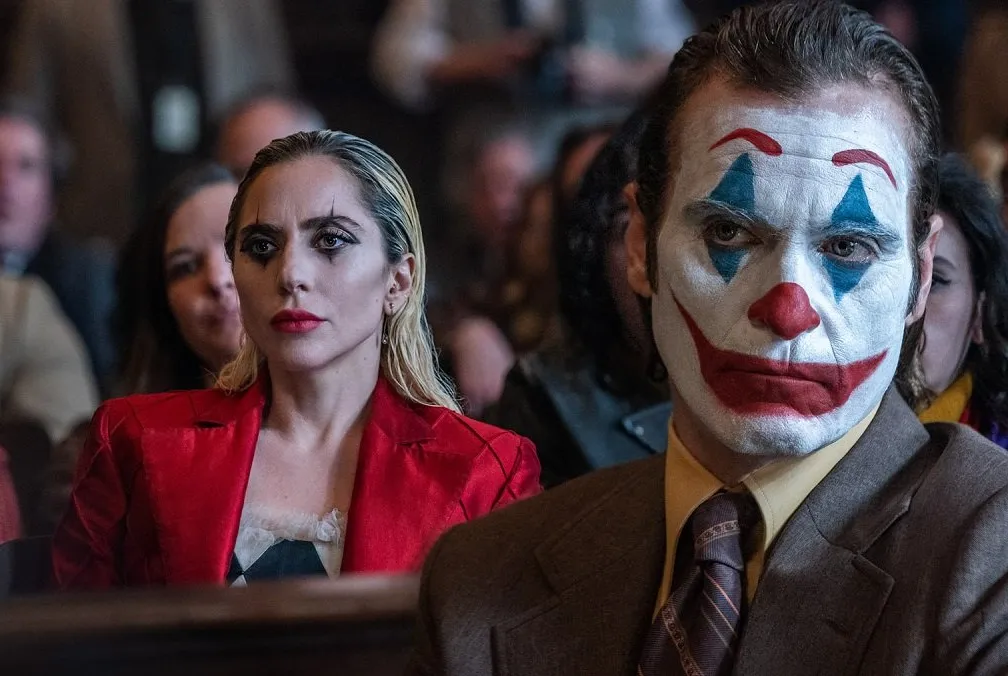Joker: Folie à Deux is a meandering mess with no clear sense of identity
Written by Ian Thomas Malone, Posted in Blog, Movie Reviews, Pop Culture
Two prominent complaints surfaced in the wake of Joker’s blockbuster success in 2019. The first criticism took aim at the way Todd Phillips’s origin story bent over backward to garner sympathy for the most notorious villain in the history of comic books, if not the entirety of American popular culture. The second focuses more on the film’s derivative nature, an excessively derivative take on Taxi Driver and The King of Comedy. Neither of these legitimate criticisms stopped the film from grossing over a billion dollars against a modest budget, a smash hit with fertile ground for a sequel.
There is no set formula for what makes a sequel work. At a bare minimum, one might hope to see a story that moves the ball forward in some tangible way, or uncovers something fresh to say about its subjects. Joker: Folie à Deux does not cross this small bar. It’s unclear if anyone even tried. Rarely does a film plod along with such reckless abandon toward the idea that anyone is supposed to enjoy what they’re watching.
Folie à Deux mostly centers its narrative on the trial of Arthur Fleck (Joaquin Phoenix) for his actions in the first film. Living out his days in the custody of Arkham State Hospital, Fleck is frequently abused by the prison guards, largely keeping to himself. While walking to a meeting with his lawyer (Catherine Keener), Fleck comes across a music therapy session in part of the hospital not used for inmates, where one patient Harleen “Lee” Quinzel (Lady Gaga) quickly takes an interest in him. Lee sparks an interest in music within Arthur, sending him on numerous hallucinogenic interludes that comprise a large part of the film.
The narrative is essentially split into three camps. Folie à Deux tries to be a musical, a psychological thriller, and a courtroom drama, all at the same time. It succeeds with none of them. The songs are terrible. Worse, they’re forgettable.
Phoenix, who won an Oscar for his last go-around as Joker, appears to be functioning on autopilot. Much like the “incels” who championed the first film, Arthur is merely a reactionary figure responding to the world around him. The Joker is supposed to be an agent of chaos. Folie à Deux’s Fleck is just an aging edge lord who frequently appears bored or indifferent to the world around him. There is the sense that the musical interludes are supposed to serve as an escape from the monotony, but they’re not strong enough to make much of an impact.
The courtroom scenes are quite boring. A pre-Two Face Harvey Dent (Harry Lawtey) anchors the prosecution. While Lawtey puts forth an admirable effort, the script gives him nothing to work with. The legal drama plays out like a run-of-the-mill episode of Law and Order or The Practice.
Lady Gaga brings some interesting depth to Quinzel, whose backstory follows Fleck’s lead in being a loose riff on the comics. The script once again fails its actors, with Gaga being given little to work with. Folie à Deux reduces one of the most interesting new female comic book characters of the past few decades into the Manic Pixie Dream Girl trope. It’s almost as if Phillips included her for the sole purpose of proving that the male basement dwellers weren’t the only people obsessed with the lunatic that is Arthur Fleck.
Successful sequels bring something new to the table. Folie à Deux starts off reasonably strong, building up the panopticon that is the Arkham State Hospital. The pacing is a complete mess once the courtroom is introduced. The film spends large chunks of its back half alternating between boring musical sequences and testimony from characters from the first film. The 138-minute runtime is painfully long, a meandering film that could’ve easily cut a half hour without missing a beat.
For all the complaints about Joker being derivative or morally irresponsible, the first film at least had a story to tell. Folie à Deux is fueled off scraps from the first, laced with boring musical interludes that add nothing to the story. Films do not need to be responsible, but all narratives should have something to say. Folie à Deux brings nothing to the table, an embarrassing waste of time for everyone involved.












